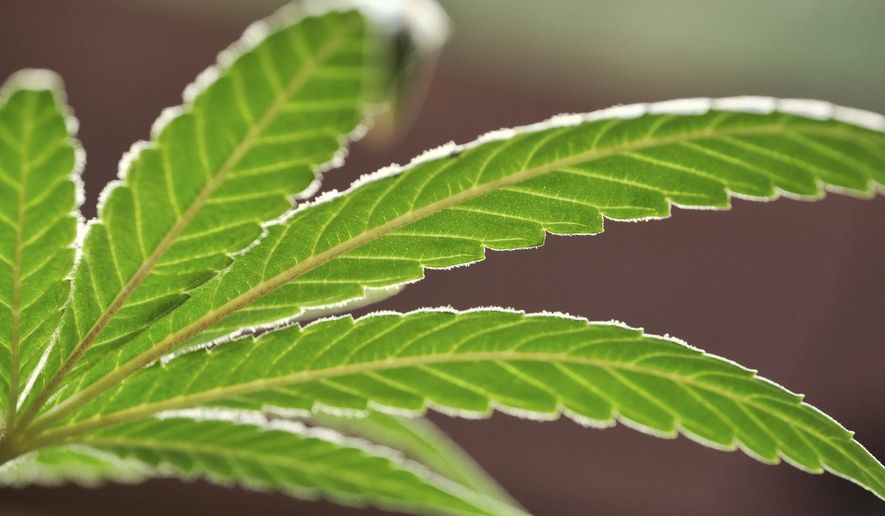Pro-pot activists are convinced that marijuana ballot measures will help juice voter turnout this year and potentially push Democrats over the top in key states such as Arizona and Montana — a political calculus President Trump has fretted about.
Marijuana legalization measures are on the ballot in those two states, home to competitive presidential and/or Senate contests, plus Mississippi, New Jersey, and South Dakota.
“Yes, it matters and there’s a reason Donald Trump doesn’t want it on the ballot,” said Peter Marcus, a spokesman for Terrapin Care Station, a multistate cannabis company. “The cannabis voter has the power to swing a race.”
Mr. Marcus, formerly a reporter in Colorado during that state’s legalization battle in 2012, was apparently referring to comments Mr. Trump directed at former Wisconsin Gov. Scott Walker when the president was campaigning in August.
“The next time you run please don’t put marijuana on the ballot at the same time you’re running,” Mr. Trump said. “You brought out like a million people that nobody ever knew were coming out, right?”
Mr. Walker narrowly lost a reelection bid in 2018 to Democratic Gov. Tony Evers when legalization questions on the ballot passed in more than a dozen localities.
In Arizona, where recent polling has shown Mr. Trump running neck-and-neck with Democratic presidential nominee Joseph R. Biden, some polling has shown voters embracing Proposition 207, which would legalize the possession of one ounce of marijuana for people ages 21 and older.
A majority of likely voters, 55%, said they support legalizing recreational marijuana in Arizona while 37% said they were opposed, according to a poll this month from the firm OH Predictive Insights.
“Clearly, the group that’s most favorable is the 18-34 crowd,” said Mike Noble, the group’s chief of research. “It will have an effect. However, I don’t think it will be nearly as prevalent compared to other single ideological issue ballot initiatives.”
The same survey showed Mr. Biden holding a 4-point, 49%-45% lead over Mr. Trump and Democratic Senate candidate Mark Kelly leading Republican Sen. Martha McSally by 5 points, 50%-45%.
In Montana, home to a competitive Senate race between GOP Sen. Steve Daines and Gov. Steve Bullock, two marijuana-related items are on the ballot.
Forty-nine percent of respondents said they plan to support legalization compared to 39% who said they were opposed, according to a survey this month from Montana State University.
“I think it is important to think about a ballot as a complete organic entity,” said David Parker, a Montana State professor who helped conduct the poll. “Young voters strongly are in favor of the measure, and they tend to be Democratic leaning.”
Mr. Bullock led Mr. Daines by 2 points, 49%-47%, in the same poll.
Floyd Ciruli, a Colorado-based pollster, said proponents of ballot items generally try to play up the turnout argument as a way to attract support from political parties and win fundraising.
“All of those advocates, some are conservative, some are liberal, argue it’ll help,” Mr. Ciruli said. “Whether it does or not, I haven’t seen a lot of evidence. My sense is, generally, that a presidential race dominates what people talk about.”
Mr. Marcus, though, pointed to the Senate race in Colorado between Republican Sen. Cory Gardner and former Gov. John Hickenlooper as proof that elected officials believe the issue does move voters.
Mr. Hickenlooper, who famously told potential pot-smokers not to “break out the Cheetos or Goldfish too quickly” after Coloradans voted to legalize recreational weed in 2012, has since warmed to the issue.
Mr. Gardner, a staunch conservative and ally of Mr. Trump, has become a leading advocate to try to open up banking services for the legal marijuana industry.
“Both of these candidates found it necessary to sort of walk back their stances, or at least reevaluate their stances, potentially for political power in the race,” Mr. Marcus said.
Marijuana is legal for adult recreational use in 11 states and the District of Columbia. Medical marijuana is legal in more than 30 states.
Mr. Biden has said he supports decriminalization, though he hasn’t gone as far as advocating for legalization at the federal level.
That is further than Mr. Trump is willing to go on the issue in public, though the president has appeared open in the past to legalizing marijuana for medicinal purposes.
Mr. Trump’s campaign intervened in Mississippi this month to make it clear that the president does not support a ballot measure that would legalize medical marijuana.
Michael Glassner, chief operating officer for the Trump campaign, said a mailer that uses the president’s past words and says “President Trump has stated his complete support for medical marijuana” could trick voters into backing the measure because they think Mr. Trump himself supports it.
“Therefore, let us be clear about this: President Trump has never stated his support for passage of Initiative 65 or the legalization of medical marijuana in Mississippi,” Mr. Glassner wrote to Jamie Grantham, a spokeswoman for Mississippians for Compassionate Care.
Ms. Grantham said in response that the group stands by the mailer.
“President Trump has clearly stated on multiple occasions that he supports medical marijuana,” she said. “That is all that we’ve shared — the truth.”
• David Sherfinski can be reached at dsherfinski@washingtontimes.com.




Please read our comment policy before commenting.